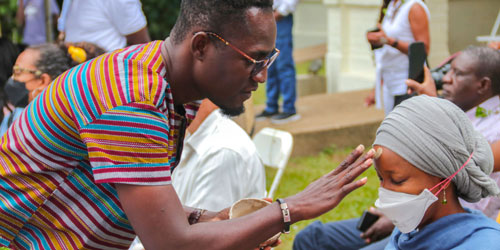MacArthur President John Palfrey discusses our work to create an equitable recovery and support a BlPOC-led reimagining of what is possible.
We are expanding our vision of the world and what is possible.
Philanthropy is being called on to meet the moment by funding racial and social justice movements that drive deep and lasting change. To hasten an equitable recovery in the wake of the pandemic, MacArthur is committed to a BlPOC-led reimagining of what is possible that prioritizes their vision and needs.
In June, we announced that we were issuing bonds to make $125 million grants and investments in people, organizations, and communities. The additional grantmaking will support the reinvention of systems and structures to create a more just, equitable, and resilient world. The first $25 million in grants will address anti-Black racism, support Native Americans impacted by COVID-19, strengthen voter education and mobilization, and combat voter suppression.
While we are just getting started, we intend to allocate the funds with a focus on racial and ethnic equity. MacArthur has three overarching and interlocking goals: hasten an equitable recovery; seize the opportunity to create lasting transformation; and help reimagine what is possible for communities and organizations.
To hasten the equitable recovery, we will sustain and strengthen nonprofits and communities in the wake of COVID-19. The pandemic has ravaged some communities more than others and dramatically exposed underlying racial inequities. We will consult with and seek input from communities most affected and fund their work as organizations define it.
For our second focused area of grantmaking, seizing the opportunity for transformation: we will support the self-determination and mobilization of people of color and young people to engage and shift systems. Civic participation, empowerment, and social entrepreneurship can improve representation and outcomes for communities. The initial funding from this area will protect voting rights, combat disinformation, and advance democracy, both in an election year and beyond.
The third area of work will explore further opportunities for impact. Innovation, creativity, and bold ideas often emerge in crisis. We are seeking new ways of thinking and working that can serve people in our city, country, and global communities. Internally, we are calling it “blue sky” thinking: we are looking for areas where our funds can have transformative and systemic impact, in ways that center Black, Indigenous, and people of color perspectives, communities, and leaders.
We are being intentional in our approach by seeking input from the communities we aim to support. Taking lessons from our early experiences with participatory grantmaking, we have convened an advisory group to help guide this work, made up of leaders in and of communities most impacted by systemic racial inequality and by the pandemic.
Finally, we look to the future. What lessons can we learn from this once in a lifetime moment? What lasting changes do we need to make as an organization? How can we deepen our understanding of racial justice grantmaking in a way that is enduring, rather than just immediate? To realize the promise of this moment we need a sustained focus on anti-Black racism.
We look forward to the challenging work to come, creating a learning community with other foundations, and continuing to stand in solidarity with our grantee partners.




